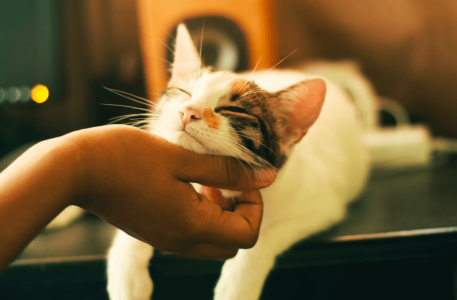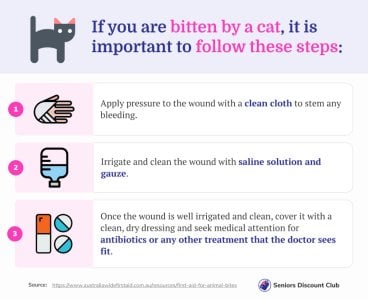What a cat-astrophe! An Aussie traveller's innocent encounter with a local animal became a costly lesson
- Replies 10
The world is an absolute treasure trove of awe-inspiring destinations, and for adventurous Aussies looking to broaden their horizons and immerse themselves in new cultures, travelling is the ultimate escape.
One of the biggest perks of exploring unfamiliar lands is getting up close and personal with the local wildlife.
But as much as we all love animals, it's important to remember that they're still wild creatures, and we should always maintain a safe distance. Sounds like common sense, right?
Well, one Aussie tourist got a rude awakening on her trip to Nicaragua, and boy, did it cost her a pretty dollar!
Meet Sarah Lancaster from Tasmania. She was excited for her Nicaraguan adventure, ready to embrace the exotic landscapes and creatures of the region. Little did she know that a seemingly innocent encounter would turn into a wild (and expensive!) ride.

It was just a typical day at the hostel for Sarah, enjoying her Nicaraguan adventure and soaking in the local culture. As she bent down to pet the hostel’s cute resident cat, little did she know that this innocent gesture would turn her trip upside down!
The cat seemed friendly, and Sarah wasn't the only one giving it some love. But in a split second, the cat bit her finger, catching her off guard.
At first, Sarah brushed it off, thinking it was no big deal. But as she chatted with her Nicaraguan friends, doubts started creeping in – had the cat been vaccinated against rabies?
Concerned about the deadly virus that can be transmitted to humans through bites or saliva of infected animals, Sarah sought advice from Australian health authorities. What she heard left her stunned – she needed post-exposure prophylaxis (PEP) treatment, and she couldn't get it in Nicaragua!
With the help of her travel insurance, Sarah had to fly all the way to Florida for the life-saving shots, and the bill? A jaw-dropping $60,000 (that's around $89,000 in AUD)!
'I couldn't believe the price of the shots. There's no way I could have paid for it on my own,' Sarah recalled, forever grateful for her travel insurance that covered the hefty medical costs.
Sarah's unfortunate experience serves as a powerful reminder to all travellers: never let your guard down when it comes to animals. Don't let her misfortune become yours – take heed of these crucial tips to stay safe and prepared for your adventures!
Before jetting off to an exotic destination, make sure to consult your doctor and get all the necessary vaccinations. Diseases like rabies are preventable, and taking the time to get vaccinated can save you from potential health risks.
No matter how cute or friendly an animal may seem, always exercise caution. Animals, even seemingly harmless ones, can still pose risks. Keep a safe distance, and avoid direct contact, especially with wild or stray animals.
In addition to vaccinations and cautious behaviour, having reliable travel insurance is an absolute must! Sarah's story is a stark reminder of the importance of being covered by a comprehensive travel insurance policy.
Medical emergencies can happen when least expected, and the last thing you want is to be caught off-guard with crippling medical bills.
As a traveller, it's important to be prepared for unexpected situations, including encounters with aggressive animals. While cat bites can pose risks, it's also crucial to know how to handle dog attacks if you witness one or find yourself as the target.
In this previous article, we delved into important information on what to do in case of a dog attack, including emergency steps and self-defence strategies to ensure your safety, whether while you're around the neighbourhood or travelling abroad.

Members and fellow travellers, let's learn from Sarah's experience and take proactive steps to ensure our safety abroad. Do your research, take precautions around animals, and, most importantly, invest in a good travel insurance policy.
Stay safe, stay insured, and make your adventures worry-free!
Have you ever had an unexpected encounter with an animal while travelling abroad? How did you handle it, and what precautions did you take?
Do you have any advice you would give to fellow travellers when it comes to animal encounters during international travel? Any personal anecdotes or lessons learned? Share them in the comments!
One of the biggest perks of exploring unfamiliar lands is getting up close and personal with the local wildlife.
But as much as we all love animals, it's important to remember that they're still wild creatures, and we should always maintain a safe distance. Sounds like common sense, right?
Well, one Aussie tourist got a rude awakening on her trip to Nicaragua, and boy, did it cost her a pretty dollar!
Meet Sarah Lancaster from Tasmania. She was excited for her Nicaraguan adventure, ready to embrace the exotic landscapes and creatures of the region. Little did she know that a seemingly innocent encounter would turn into a wild (and expensive!) ride.

An Australian tourist racked up a hefty medical bill after being bitten by a cat abroad. Credit: Unsplash/Yerlin Matu.
It was just a typical day at the hostel for Sarah, enjoying her Nicaraguan adventure and soaking in the local culture. As she bent down to pet the hostel’s cute resident cat, little did she know that this innocent gesture would turn her trip upside down!
The cat seemed friendly, and Sarah wasn't the only one giving it some love. But in a split second, the cat bit her finger, catching her off guard.
At first, Sarah brushed it off, thinking it was no big deal. But as she chatted with her Nicaraguan friends, doubts started creeping in – had the cat been vaccinated against rabies?
Concerned about the deadly virus that can be transmitted to humans through bites or saliva of infected animals, Sarah sought advice from Australian health authorities. What she heard left her stunned – she needed post-exposure prophylaxis (PEP) treatment, and she couldn't get it in Nicaragua!
With the help of her travel insurance, Sarah had to fly all the way to Florida for the life-saving shots, and the bill? A jaw-dropping $60,000 (that's around $89,000 in AUD)!
'I couldn't believe the price of the shots. There's no way I could have paid for it on my own,' Sarah recalled, forever grateful for her travel insurance that covered the hefty medical costs.
Sarah's unfortunate experience serves as a powerful reminder to all travellers: never let your guard down when it comes to animals. Don't let her misfortune become yours – take heed of these crucial tips to stay safe and prepared for your adventures!
Before jetting off to an exotic destination, make sure to consult your doctor and get all the necessary vaccinations. Diseases like rabies are preventable, and taking the time to get vaccinated can save you from potential health risks.
No matter how cute or friendly an animal may seem, always exercise caution. Animals, even seemingly harmless ones, can still pose risks. Keep a safe distance, and avoid direct contact, especially with wild or stray animals.
In addition to vaccinations and cautious behaviour, having reliable travel insurance is an absolute must! Sarah's story is a stark reminder of the importance of being covered by a comprehensive travel insurance policy.
Medical emergencies can happen when least expected, and the last thing you want is to be caught off-guard with crippling medical bills.
As a traveller, it's important to be prepared for unexpected situations, including encounters with aggressive animals. While cat bites can pose risks, it's also crucial to know how to handle dog attacks if you witness one or find yourself as the target.
In this previous article, we delved into important information on what to do in case of a dog attack, including emergency steps and self-defence strategies to ensure your safety, whether while you're around the neighbourhood or travelling abroad.
Key Takeaways
- Sarah, an Aussie traveller, learned the hard way about the importance of being cautious around animals while travelling abroad after getting bitten by a cat in Nicaragua, which led to costly medical treatment for potential rabies exposure.
- Her story serves as a cautionary tale, emphasising the need to stay vigilant around local and wild animals and have proper insurance coverage while exploring the world to ensure a safe and worry-free travel experience.
Members and fellow travellers, let's learn from Sarah's experience and take proactive steps to ensure our safety abroad. Do your research, take precautions around animals, and, most importantly, invest in a good travel insurance policy.
Stay safe, stay insured, and make your adventures worry-free!
Have you ever had an unexpected encounter with an animal while travelling abroad? How did you handle it, and what precautions did you take?
Do you have any advice you would give to fellow travellers when it comes to animal encounters during international travel? Any personal anecdotes or lessons learned? Share them in the comments!








